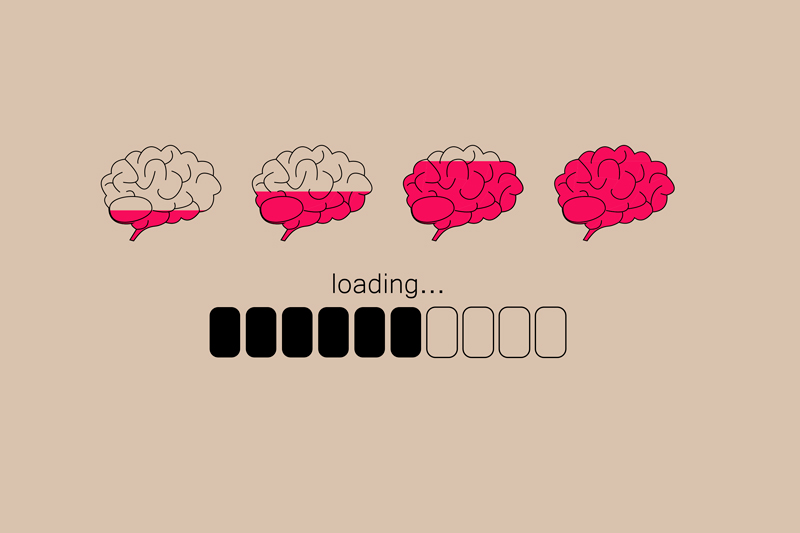Did you know that lifestyle habits that improve your overall health help to create a healthier brain? Growing evidence indicates that people can reduce their risk of cognitive decline by adopting key lifestyle habits that help reduce inflammation. Decreasing inflammation in the brain helps promote neuroplasticity, the brain’s ability to reorganize itself by forming new neural connections throughout life. This allows the neurons (nerve cells) to compensate for injury and disease or adjust their activities in response to new situations or changes in their environment.
What Causes Inflammation in Our Brains?
It may not surprise you to learn that stress of any kind can lead to inflammation not only in the body’s organs, but also in the brain. Stress elevates the level of the hormone cortisol, leading to inflammation, which in turn creates hormone imbalances, cognitive impairment, heightened blood sugar levels, hypertension, and susceptibility to disease. The good news is that controlling stress levels reduces the release of cortisol, therefore decreasing inflammation.
How exactly do we reduce stress in the busy and taxing environments that most of us experience today? We can begin by adopting a healthy lifestyle through the natural paths to wellness including a healthy diet, daily movement, sufficient sleep, reflection /meditation, and a joyful heart. Adopting the healthy habits that these paths provide, thus giving the brain the ability to perform at its best, positions us well for well-being in body, mind, and spirit.
Healthy Diet
The number one path to boosting brain health is eating a healthy and unprocessed diet (with support as necessary from supplements, herbs, and homeopathy) that includes healthy fats like extra-virgin olive oil, coconut oil, and diet high in antioxidant-rich vegetables and fruits. These foods decrease inflammation and reduce the risk of cognitive decline.
You may not be aware that there is a close connection between abnormal gut flora and abnormal brain development. Your gut is your “second brain,” and your gut bacteria transmits information to your brain via the vagus nerve. Be mindful of your gut health because it impacts your brain function. Just as you have neurons in your brain, you also have neurons in your gut, including neurons that produce the neurotransmitters like the serotonin found in your brain. Your gut bacteria are an active and integrated part of your body. They are heavily dependent on your diet and vulnerable to your lifestyle. Consuming a lot of processed foods can severely compromise your gut bacteria because it destroys the healthy microflora that keeps your gut functioning well. Avoid sugar and processed foods, and eat meals of whole and traditionally fermented foods (like sauerkraut, kimchi, and yogurt), that are rich in naturally occurring good bacteria. Taking a probiotic supplement is another great addition to optimize your gut flora and subsequently support your brain’s health.
Beyond whole foods, recent research has bolstered the importance of Vitamin B12, B6 and folate in keeping your mind sharp as you age. These B-vitamins are also linked to heart health by keeping homocysteine levels low. Some top sources of B vitamins include meats, wild-caught seafood (salmon), poultry, eggs, dairy products, legumes, leafy greens, seeds and nuts.
Researchers have discovered that activated vitamin D receptors increase nerve growth in the brain. They have located metabolic pathways for vitamin D in the hippocampus and cerebellum, areas of the brain that are involved in planning, processing of information, and the formation of new memories. Although you can’t get this vitamin from food, appropriate sun exposure is all it takes to keep your levels where they need to be for healthy brain function. If, however, your sun exposure is limited because of your location or your lifestyle, taking a Vitamin D3 supplement may be needed.
Daily movement
Movement is a valuable part of any overall body wellness plan and is associated with a lower risk of cognitive decline. The body’s self-healing mechanisms depend on unimpeded flow of lymph, blood, and other fluids, all of which are promoted by daily movement. Increasing the blood flow to your brain and body decreases inflammation while reducing potential dementia risk factors such as high blood pressure and diabetes. Choose whatever movement you desire and remember to practice it daily to keep the nutrients and blood flowing freely.
Adequate Sleep
Restorative sleep plays a vital role in good health and well-being throughout your life. During sleep, your body is working to support healthy brain function and maintain your physical health. In addition to restoring the body at a cellular level, sleep allows the brain to form new pathways that help you learn, remember, and process information. Getting six to eight hours of rest daily keeps your body and brain healthy and functioning at optimum levels.
Joyful Heart
Every thought releases some type of chemical. With good thoughts, when you’re feeling happy or optimistic, cortisol decreases and the brain produces serotonin, creating a feeling of well-being. Daily reflection, contemplation or meditation can promote positivity and peaceful thoughts that will help you find joy.
Dr. Marie Mammone is a Connecticut Licensed and Board Certified Naturopathic Doctor practicing at the Naturopathic and Acupuncture Health Center in Wethersfield, CT for over 19 years. She welcomes working with her clients to maintain and regain their health using her knowledge of a variety of therapies including clinical nutrition, botanicals, homeopathy, acupuncture and much more.
For more information, please call today at (860)529-1200 or read more at: www.NAHcenter.com.
